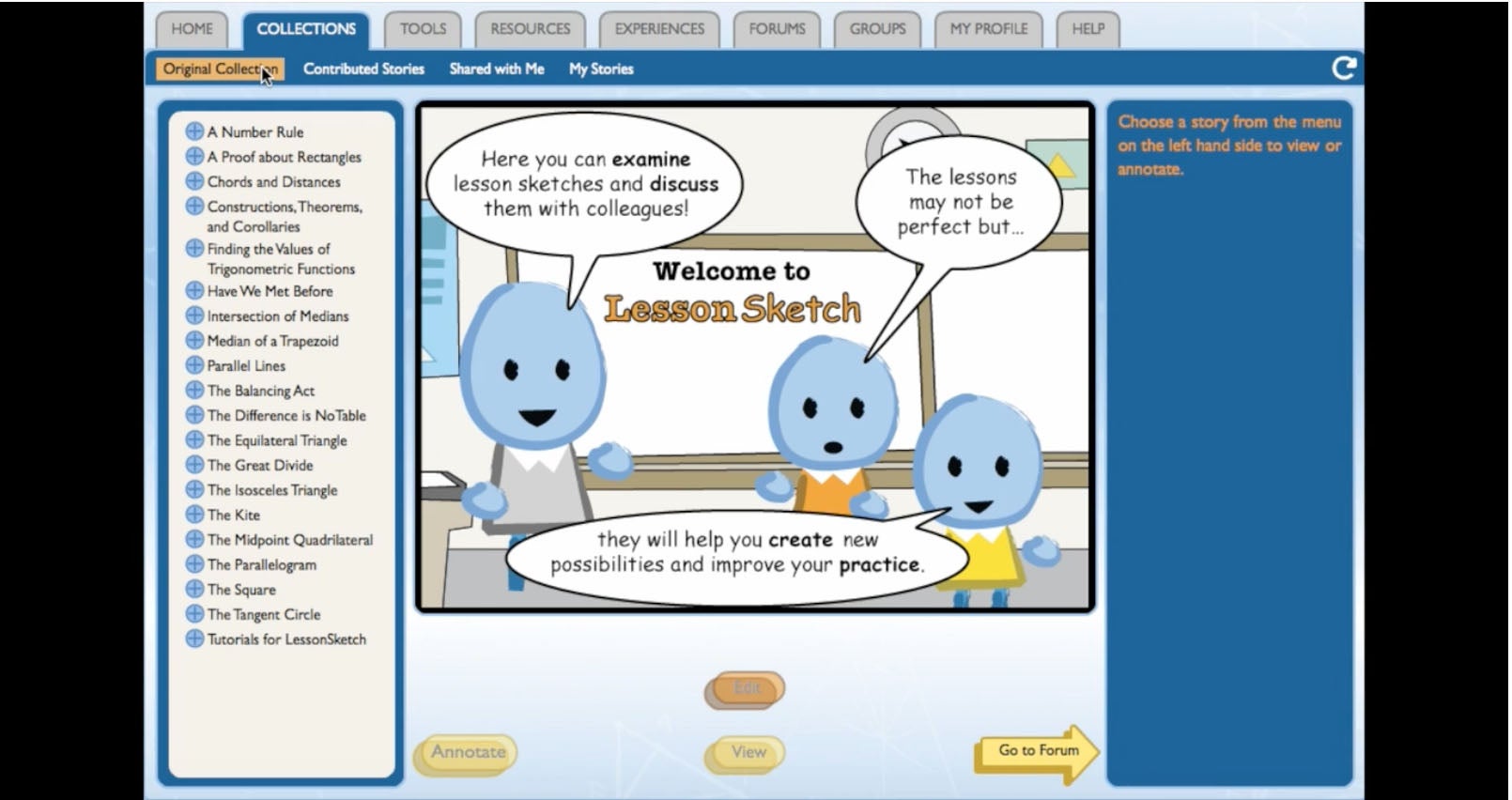
With two rounds of NSF funding, ThEMaT is a research and development program administered jointly by Daniel Chazan at the University of Maryland and by Patricio Herbst at the University of Michigan (NSF grants ESI-0353285; DRL-0918425). ThEMaT has explored technological developments related to the authoring of video of classroom interaction. With the first round of funding, ThEMaT developed a suite of animated representations of teaching, depicting scenes from both algebra and geometry classrooms, to use as probes into the practical rationality of mathematics teaching. These animated representations of teaching invite teachers to consider what happens in classrooms as well as what could happen. Based on models of content specific classroom interaction, the animations often include breaches in how mathematics teaching usually proceeds. Click here to watch A Clip from The Great Divide where students are solving equations. In addition to investigating issues in the teaching of algebra and geometry, the project explored the representational affordances of hypothetical animations of classroom interaction rather than actual video of live classrooms.
With the second round of funding, ThEMaT has created LessonSketch, originally as a research and development platform for our research groups. In our studies, LessonSketch has been used to create and implement online multimedia research questionnaires for studying the rational of mathematics teaching as a practice. In addition, LessonSketch supports the dissemination of the animations created with the first round of funding for viewing and annotation by teacher educators and teachers. Moreover, the LessonSketch platform contains web based software tools that enable teacher educators to ask teacher candidates to interact with videos, animations, and image sequences and within which teacher candidates can be asked to create, share, and discuss their own practice. LessonSketch also includes capacities that allow teacher educators to use these resources to create on-line experinces for teacher preparation candidates.
Selected ThEMaT-related publications/presentations
Copyright Notice: The documents distributed here have been provided as a means to ensure timely dissemination of scholarly and technical work on a noncommercial basis. Copyright and all rights therein are maintained by the authors or by other copyright holders, notwithstanding that they have offered their works here electronically. It is understood that all persons copying this information will adhere to the terms and constraints invoked by each author's copyright. These works may not be reposted without the explicit permission of the copyright holder.
Herbst, P. and Chazan, D. (2012). On the instructional triangle and the sources of justification for the actions of the mathematics teacher. ZDM—The International Journal of Mathematics Education, 44(5), 601–612.
Chazan, D., Sela, H. and Herbst, P. (2012). Has the Doing of Word Problems in School Mathematics Changed? Initial Indications from Teacher Study Groups. Cognition and Instruction. 30(1), 1-38.
Chazan, D. and Herbst, P. (2012). Animations of classroom interaction: Expanding the boundaries of video records of practice. Teachers College Record, 114(3). 1-34. http://bcove.me/iy7lsomi
Herbst, P., and Chazan, D. (2011). Research on practical rationality: Studying the justification of action in mathematics teaching. The Mathematics Enthusiast, 8(3), 405-462.
Chazan, D., Herbst, P., &, Sela, H. (2011). Instructional alternatives via a virtual setting: Rich media supports for teacher development. In O. Zaslavsky & P. Sullivan (Eds.), Constructing knowledge for teaching secondary mathematics: Tasks to enhance prospective and practicing teacher learning (pp. 23-37). New York: Springer.
Herbst, P., Nachlieli, T., and Chazan, D. (2011). Studying the practical rationality of mathematics teaching: What goes into "installing" a theorem in geometry? Cognition and Instruction, 29(2), 1-38.
Chazan, D. and Herbst, P. (2011). Challenges of particularity and generality in depicting and discussing teaching. For the Learning of Mathematics, 33(1), 9-13.
Herbst, P., and Chazan, D. (2011). On creating and using representations of mathematics teaching in research and teacher development: Introduction to this issue. ZDM—The International Journal of Mathematics Education, 43(1), 1-6.
Herbst, P., Chazan, D., Chen, C., Chieu, V.M., and Weiss, M. (2011). Using comics-based representations of teaching, and technology, to bring practice to university "methods" courses. ZDM—The International Journal of Mathematics Education, 43(1), 91-104.
Chazan, D. and Sandow, D. (2011). "Why did you do that?" Justification in algebra classrooms. Mathematics Teacher, 104(6). 460-464.
Herbst, P. and Chazan, D. (2009). Methodologies for the study of instruction in mathematics classrooms. Recherches en Didactique des Mathématiques, 29(1), 11-33.
Chazan, D. & H. M. Lueke. (2009). Exploring tensions between disciplinary knowledge and school mathematics: Implications for reasoning and proof in school mathematics. In D. Stylianou, E. Knuth, & M. Blanton (eds.), Teaching and Learning Mathematics Proof Across the Grades (pp. 21-39). Erlbaum: Hillsdale, NJ.
Herbst, P. & D. Chazan (2006). Producing a viable story of geometry instruction: What kind of representation calls forth teachers' practical rationality? In S. Alatorre, J. L. Cortina, M. Sáiz, & A. Méndez (eds.), Proceedings of the Twenty Eighth Annual Meeting of the North American Chapter of the International Group for the Psychology of Mathematics Education (Vol.28; II: 213-220). Mérida, Yucatán, México: Universidad Pedagógica Nacional.
Herbst, P. & D. Chazan. (2003). Exploring the practical rationality of mathematics teaching through conversations about videotaped episodes: The case of engaging students in proving. For the learning of mathematics. 23(1). 2-14.
Maryland ThEMaT project members (since inception):
Daniel Chazan, Bridget Arvold, Eden Badertscher, Orly Buchbinder (postdoc), Kyle Cochran, Tom Coleman, Michael Conklin, Ann Edwards, Shoshana Gilead (postdoc), Alice Cooke Henke, Whitney Johnson, Michael Lueke, Amanda Mason-Singh, Jason Miller, Carolina Napp, Dara Sandow, Hagit Sela (postdoc), Allyson Toronto, Kenneth Wright, Chao Xie.
Video Showcase
Dr. Daniel Chazan's ThEMaT 3 project participated in the National Science Foundation's 2015 Teaching and Learning Video Showcase. We invite you to view the 3 minute video Developing Rich Media-based Materials for Practice-based Teacher Education.